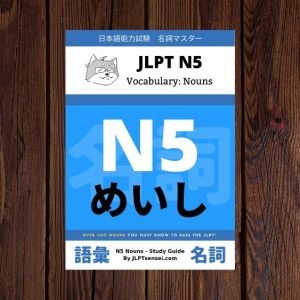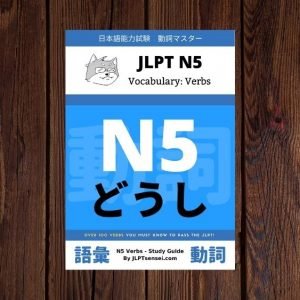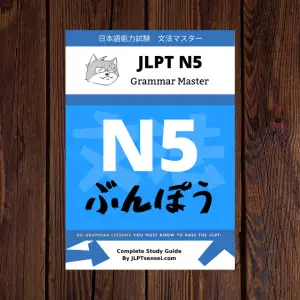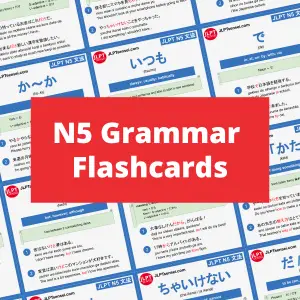
This is a list of the vocabulary that you need to know in order to pass the JLPT N5. In total, you will need to have a vocabulary of about 800 words.
This list includes lessons for the most common and important words for you to know, all listed in alphabetical order.
See our full study guide for how to pass the JLPT N5.
- See all JLPT N5 nouns
- Sell all JLPT N5 verbs
- Sell all JLPT N5 adverbs
- See all JLPT N5 adjectives
- See all JLPT N5 pre-noun adjectivals
- See all JLPT N5 particles
- See all JLPT N5 katakana words
Bonus downloads for our members on Patreon:
- All Ebooks and printable PDF lists (grammar, vocab, kanji, etc).
- Flashcards & more! (see all benefits)
| # | ごい | Vocabulary | Type | Meaning |
|---|---|---|---|---|
| 601 | 後ろ | ushiro うしろ | Noun | back; behind; rear |
| 602 | 薄い | usui うすい | Adjective, い-adjective | thin; weak |
| 603 | 歌 | uta うた | Noun | song |
| 604 | 歌う | utau うたう | Verb, Godan verb, Intransitive verb, Transitive verb | to sing |
| 605 | 上着 | uwagi うわぎ | Noun | coat; tunic; jacket; outer garment |
| 606 | ワイシャツ | wai shatsu | Noun, Katakana, Wasei | shirt |
| 607 | 若い | wakai わかい | Adjective, い-adjective | young |
| 608 | 分かる | wakaru わかる | Verb, Godan verb, Intransitive verb | to understand; to comprehend; to grasp; to see; to get; to follow |
| 609 | 悪い | warui わるい | Adjective, い-adjective | bad; poor; undesirable |
| 610 | 忘れる | wasureru わすれる | Verb, Ichidan verb, Transitive verb | to forget |
| 611 | 渡る | wataru わたる | Verb, Godan verb, Intransitive verb | to go across |
| 612 | 私 | watashi わたし | Pronoun | I; myself |
| 613 | 渡す | watasu わたす | Verb, Godan verb, Transitive verb | to hand over |
| 614 | 山 | yama やま | Noun | mountain; hill |
| 615 | 八百屋 | yaoya やおや | Noun | greengrocer; fruit and vegetable shop; versatile |
| 616 | やる | yaru | Verb, Godan verb, Transitive verb | to do |
| 617 | 野菜 | yasai やさい | Noun | vegetable |
| 618 | 易しい | yasashii やさしい | Adjective, い-adjective | easy, simple |
| 619 | 安い | yasui やすい | Adjective, い-adjective | cheap; inexpensive |
| 620 | 休み | yasumi やすみ | Noun | rest; vacation; holiday |
| 621 | 休む | yasumu やすむ | Verb, Godan verb, Intransitive verb | to be absent; to take a day off; to rest |
| 622 | 八つ | yattsu やっつ | Noun, Numeric | eight: 8 |
| 623 | 呼ぶ | yobu よぶ | Verb, Godan verb, Transitive verb | to call out, to invite |
| 624 | 良い | yoi/ii よい/いい | Adjective, い-adjective | good |
| 625 | 四日 | yokka よっか | Noun | fourth day of the month / 4 days |
| 626 | 横 | yoko よこ | Noun | beside,side,width |
| 627 | よく | yoku | Adverb | often, well |
| 628 | 読む | yomu よむ | Verb, Godan verb, Transitive verb | to read; to guess; to predict; to read (someone's thoughts) |
| 629 | 夜 | yoru よる | Noun | evening; night |
| | ||||
| 630 | 四つ | yotsu よつ | Noun, Numeric | four; 4 |
| 631 | 洋服 | youfuku ようふく | Noun | western clothes |
| 632 | 八日 | youka ようか | Noun | eighth day of the month / 8 days |
| 633 | 弱い | yowai よわい | Adjective, い-adjective | weak |
| 634 | 雪 | yuki ゆき | Noun | snow |
| 635 | ゆっくり | yukkuri | Adverb | slowly |
| 636 | 昨夜 | yuube ゆうべ | Noun | last night |
| 637 | 郵便局 | yuubinkyoku ゆうびんきょく | Noun | post office |
| 638 | 夕方 | yuugata ゆうがた | Noun | evening; dusk |
| 639 | 夕飯 | yuuhan ゆうはん | Noun | evening meal |
| 640 | 有名 | yuumei ゆうめい | Noun, Adjective, な-adjective | famous |
| 641 | 雑誌 | zasshi ざっし | Noun | magazine |
| 642 | 全部 | zenbu ぜんぶ | Noun, Adverbial Noun | all |
| 643 | ゼロ | zero | Noun | zero |
| 644 | ズボン | zubon | Noun, Katakana | trousers; pants |
JLPT N5 vocab List total: (644)
Currently viewing page 7 of 7
JLPT N5 Study Guide
JLPT N5 Grammar Master [e-book]
Complete Study Guide
This e-book includes every grammar point you need to know in order to pass the JLPT N5, with detailed usage notes and numerous example sentences.
Pages: 192
N5 Grammar Flashcards
Full Batch Download
Download link includes:
- Print-ready PDF of square flashcards with cut-out guides (see preview)
- Full set of high quality .png image flashcards
- JLPT N5 Grammar 文法 square size (80 images)
- JLPT N5 Grammar 文法 rectangle size (80 images)
*NOTE* Officially, there are no kanji, vocabulary, or grammar lists for the JLPT. As a result, it is not possible to be certain which kanji, words, or grammar will or will not appear in a given test. Our study lists are based on prior test data and comparisons with other available lists of JLPT kanji, vocabulary, grammar, etc.



